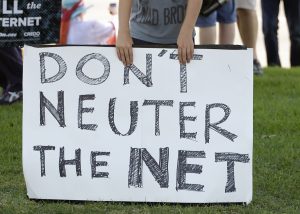 The Federal Communications Commission will continue to regulate the Internet as a public utility after the latest ruling by a federal court upholding the Obama administration’s net neutrality rules. The decision that the rules are authorized under current law was made by a three-judge panel at the United States Court of Appeals for the District of Columbia Circuit on Tuesday. The decision has broad-reaching implications for web and telecommunications companies.
The Federal Communications Commission will continue to regulate the Internet as a public utility after the latest ruling by a federal court upholding the Obama administration’s net neutrality rules. The decision that the rules are authorized under current law was made by a three-judge panel at the United States Court of Appeals for the District of Columbia Circuit on Tuesday. The decision has broad-reaching implications for web and telecommunications companies.
The doctrine known as net neutrality prohibits broadband companies from blocking or slowing the delivery of internet content to consumers. The rules also prevent internet service providers from charging content producers for faster or more reliable service. The rules apply to both mobile and fixed broadband service.
Last year, the FCC voted 3-2 to reclassify broadband internet service as a utility under a 1934 law called the Communications Act. Defining them this way increased the FCC’s powers to regulate them. The agency used this authority to enact the net neutrality rules in early 2015. FCC Commissioner Jessica Rosenworcel said at the time, “We cannot have a two-tiered Internet with fast lanes that speed the traffic of the privileged and leave the rest of us lagging.”
The decision clears the way for more rigorous regulation of broadband providers and increased protections for web users. That is a punishing blow to telecom and cable companies seeking to overturn the initial regulations imposed on them. The decision was protested by several wireless carriers, including AT&T and Verizon Wireless.
The debate on how internet service providers should be treated has been raging for years. The providers want more freedom to choose how they manage their services. Opponents of the rules claim that the regulations go far beyond the FCC’s authority and argue the Communications Act was never intended to be used this way. The decision is expected to provoke court cases from major broadband providers. The case could also still be appealed to the Supreme Court.
